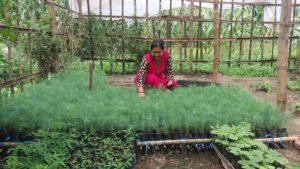Earthquake Response
On April 25th, 2015, a 7.8 magnitude earthquake devastated Nepal, leaving more than 8,000 people dead, 22,000 injured, 800,000 families without homes, 7,000 schools destroyed, and thousands of livelihoods lost.
Immediately after the disaster, World Education’s work in Nepal shifted to include relief to heavily-impacted districts, in addition to supporting existing project beneficiaries to meet their basic needs. Because of our long experience in the country, World Education participated on the UN’s Education Cluster Response Team to assess damage and develop a long-term rehabilitation plan for schools in Nepal.
Following the first earthquake, World Education set up temporary facilities called Child-Friendly Spaces in earthquake-affected areas to provide children with an area to learn, play, and—most importantly—feel safe. World Education also established more than 472 Temporary Learning Centers (TLCs) with WASH (Water, Sanitation and Hygiene) facilities throughout four districts and distributed thousands of education kits including supplies, books, and games for classrooms across the country. World Education also supported more permanent reconstruction and repair for damaged schools.

The aftermath of the earthquake is particularly dangerous for girls and women, as many human traffickers see the disaster as an opportunity to recruit them (as well as men and boys) into unsafe and exploited labor. To combat these dangers, World Education has continued its support for impacted communities beyond immediate relief efforts. (Learn more about World Education’s ongoing efforts to combat child labor and human trafficking.)
Beyond immediate relief and rebuilding, World Education’s longer-term strategy for supporting Nepal’s recovery and revitalization focuses on sustainable livelihoods development in areas where many families lost their source of income as well as their homes. By strengthening microfinance and collective savings groups and offering vocational, agricultural, and self-employment trainings, vegetable, and livestock farming training, World Education is helping vulnerable families and communities create sustainable income streams that will reduce their susceptibility to exploitation and allow them to rebuild.
